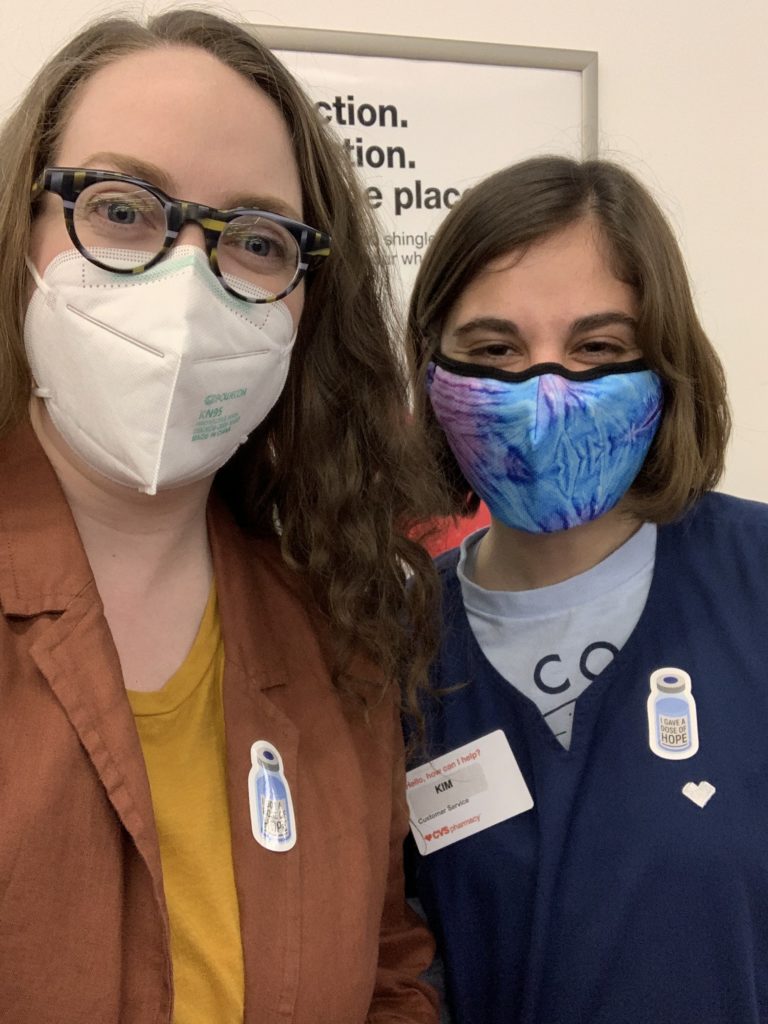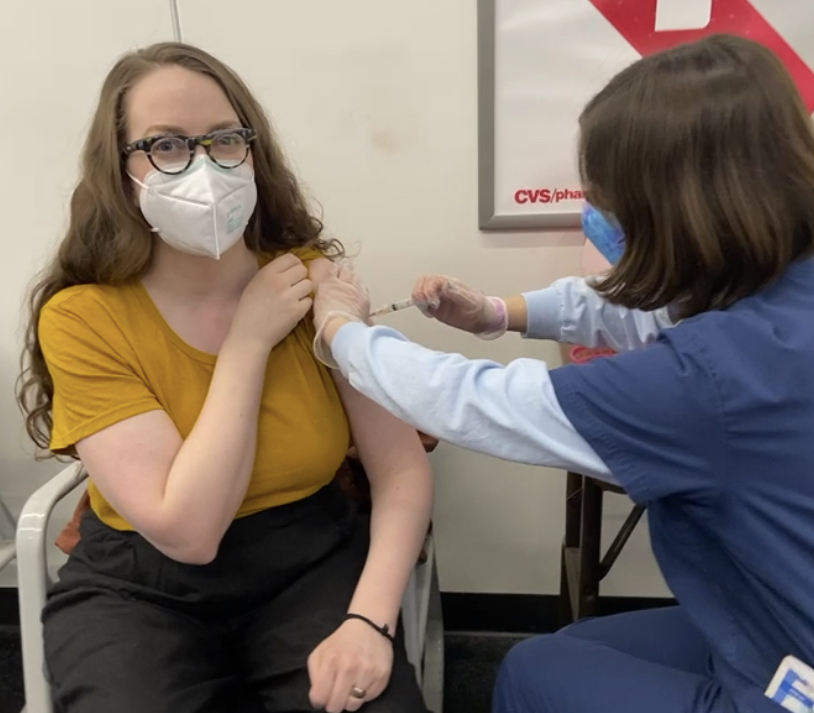After two research projects on pandemics, here’s how a Hope student came to give a Hope professor a shot in the arm

The look of relief and joy was quite evident on the masked face of Dr. Alyssa Cheadle, assistant professor of psychology, as she rolled up her sleeve to get her second COVID-19 vaccination recently at a CVS pharmacy in Holland, Michigan.
Look in a little closer on the scene though, and you’ll find that Cheadle’s delight was met with the same gladness by the person giving her the shot.
Because that person – the one who administered a .5 mL dose of Cheadle’s hope and protection — was none other than the professor’s research assistant, Kimberly Paquette from Hartland, Michigan.
“It was super meaningful to get the shot from her, not only because she is my student, but also because of our work together on two pandemic diseases.”
Dr. Alyssa Cheadle
Paquette, a psychology and biology double major who plans to attend medical school, has been a pharmacy technician at CVS for the past three years, both in her hometown and in Holland. When the pandemic necessitated that more CVS employees become trained in order to meet demand at vaccination clinics, the Hope senior stepped up. She dove into about 10 hours’ worth of coursework and hands-on training on the process of vaccine injections and became certified to administer shots, not just for the COVID vaccine but for other immunizations like tetanus and hepatitis, too.
When Cheadle heard that Paquette would be giving shots to arms at the CVS in Holland, the professor knew right where she wanted to get her last COVID vaccine.
“Kim has worked with me on two research projects — one in summer of 2019 on the polio virus, specifically post-polio syndrome, and one in the summer of 2020 when we pivoted to work on a project on COVID with collaborators at Harvard School of Public Health and Luther College,” Cheadle says. “It was super meaningful to get the shot from her, not only because she is my student, but also because of our work together on two pandemic diseases.”
Their Research and Its Effects
Of course, when Cheadle and Paquette started their research on polio, COVID-19 was not even a thing. In 2019, the two investigated the relationship between health psychology and long-term disability caused by the polio virus as part of a Mellon-Foundation-funded Grand Challenges Initiative grant. When COVID hit, they decided to look at how religion and spirituality impacts COVID safeguard compliance rates.
For that latter project, the Hope duo helped design a 15-minute survey used by the Harvard School of Public Health to survey 1,800 participants about their lives during the COVID pandemic. Paquette and Cheadle hypothesized that there would be a relationship between higher religiosity and spirituality and higher compliance rates.
“But we actually found the opposite,” says Paquette. “In some of the variables, not all of them, we had many individuals that had higher compliance but lower religiosity and spirituality.”
The two are investigating more to learn what other variables – conservative ideology and other demographic predictors, for example – might be affecting this outcome. It has been Paquette’s job to manage the data set for three researchers, and she’s presented her and their findings virtually at national conferences – the American Psychosomatic Society – and regional conferences, too – the Midwestern Psychological Association.
“Kim is essentially doing the kind of work we would expect of a graduate student or even a paid research assistant,” Cheadle explains.

Unexpected Life Lessons
What the 21-year-old college student has learned after a year living in a new pandemic has been enlightened by her research into an older one. Like many then and now, she has had to sacrifice much – a May semester abroad, travel to national conferences, normal campus life. She sees the similarities between the two pandemics and wishes others could have the same lens through which to view these current circumstances.
“Based on what I’ve learned, I would want others to know even though polio is not a threat in the United States right now, it’s still around,” she says. “I just looked up the statistics yesterday to refresh my previous statistics for our polio research, and there’s still two endemic countries, 26 outbreak countries and three at-risk countries. So, it’s very much still out here. Keeping up with the vaccines is important, because it’s not going to be completely eradicated if we stop. So just the importance of the polio vaccine and the COVID vaccine right now is very much on my mind. And, giving vaccines myself has been just a crazy experience to walk through.”
Her personal disappointments have been many, but she’s built up her patience and resiliency, she admits. She’s learned well how to take the next step when plans change, a COVID pandemic by-product it seems. After all, that is how she became trained in additional necessary skills for the good of others like Cheadle, and for herself, too.
“Just looking at my work at CVS and being able to be a first responder by administering COVID tests as well as vaccines has been a fortunate opportunity for me to learn during this time in my life,” says Paquette who is fully vaccinated. “Our research also helped me turn to religion and prayer in order to increase my trust and decrease my fear during the pandemic.”

